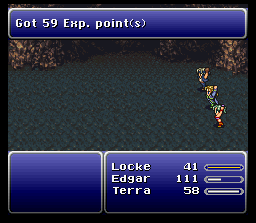One of the driving forces (and biggest points of contention) in video games is the fact that they're rooted in a reward-based system. If the player does well, the game ensures that the player feels good about himself or herself. These rewards differ from genre to genre: in role-playing games, the player may gain a tremendous amount of experience or find a rare, powerful item, while in adventure games the player may be treated to
some new dialogue to enhance their experience. This concept also applies to music. When the player
reaches the end of a level,
solves a puzzle, or
discovers something new, a victory tune often plays.
And sometimes, the characters raise the roof.
Conversely, if the player does poorly, the game is sure to indicate his or her shortcomings through the use of music. These musical cues generally activate when the player dies, fails a mission, loses a race, etc., and the most extreme of these cases is the dreaded "
Game Over" screen, indicating the ultimate failure in the game. But how do these musical clips interact with the player? What purpose do they serve other than a reinforcement of the visual indication of gain or loss?
